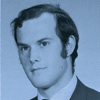Gerson S. Sher – 50th Reunion Essay
Gerson S. Sher
 1230 23rd St NW, Apt 710
1230 23rd St NW, Apt 710
Washington, DC 20037
gerson.sher@gmail.com
202-230-9061
Spouse(s): Margery Leveen (1969)
Child(ren): Rabbi Jeremy Sher (1977), Adam Sher (1980)
Grandchild(ren): Eli (2014), Noah (2018)
Education: Yale, BA (1969); Princeton, PhD (1975)
Career: National Science Foundation (20 years); COO, International Science Foundation (George Soros); Founding President, CRDF Global
Avocations: Piano; Racial Justice; Civilization VI; Yale Guild of Carillonneurs Advisory Board
College: Saybrook
When I entered Yale, I had no idea what I wanted to do with my life. I found Russia perplexing and interesting and knew I wanted to major in Russian studies, but beyond that, I did not have a clue.
When I graduated, I still had no idea what I wanted to do with my life. Russia was as perplexing as ever. Feeling alienated like so many of us at the time, but not exactly sure why, I got hooked on the work of a group of dissident Yugoslav Marxist philosophers for whom alienation was key to understanding both Marx and critical social theory in general.
Having gone directly to graduate school, my perplexity with both Russia and Yugoslavia continued to grow, and I still had no idea what to do with my life. Then came a crisis when I realized that while the goal of graduate school was to prepare me for teaching, I didn’t like teaching.
Still not knowing what to do with my life, by pure accident I ended up working on scientific exchange programs with the USSR and Eastern Europe. Science was the farthest thing from my mind at Yale, where I never took a science course. The work was largely administrative and I felt that this was hardly what my vaunted education at two of the nation’s most distinguished academic institutions had prepared me to do.
As it turned out, this accident turned out to be a brilliant career decision. The arcane business of managing and leading scientific cooperation with the former Soviet Union and Eastern Europe became my life’s work, and I excelled at it—but not because of any particular professional skills I learned at Yale.
What was the role of my Yale education in all this? It did not give me any serious direction toward a profession. Graduate school, for me, was simply an excuse to keep doing what I was doing at Yale, without any clear goal in mind.
Herein, perhaps, is the dilemma of the “liberal arts” education. For me, at least, it provided lots of information, more questions than answers, and a very few skills. Even the Russian I studied for four years was hardly at the level of what one would call a “skill” by the time I graduated.
At the same time, probably the most important impact of my “liberal arts” Yale education was that it led me, in my perpetual perplexity, to keep asking questions. The most perplexing and challenging of them all, “So What?”, has often led only to ever greater perplexity, and sometimes conflict—but it is the root of all truly critical, radical thinking, which seeks, in Marx’s words, “to grasp things by the root.” Did I acquire those skills at Yale, through my accidental career, or just by being fed up with the term “liberal”? I don’t know. But I do believe that my Yale education gave me the ability to write, to formulate these very sentences, and I worry greatly that this is a vital skill of an educated person that is being lost in our increasingly technical and mechanistic world.
If the above is blank, no 50th reunion essay was submitted.
